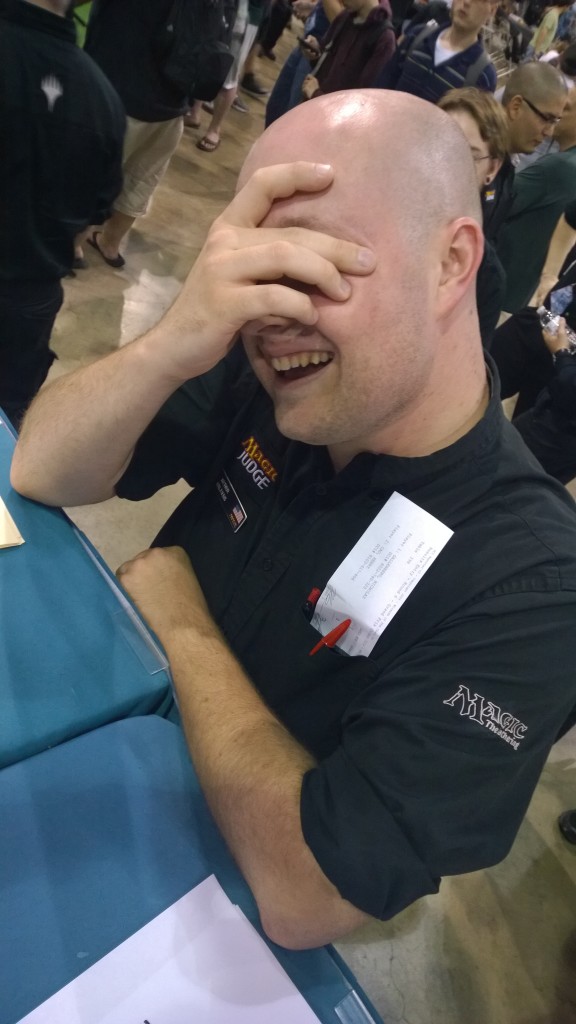All right … now that things are a little less frantic, let’s turn that last post into something with more useful content.
First of all, some context on what happened. When DCI Reporter takes in the last result of a round, it then spends some time processing all of the results and getting the points for the wins associated with each player record. When that process completes, then you have the right records for generating pairings for the next round. Unfortunately, this process is not instantaneous, and furthermore, the program does not block you from doing other things while it’s processing. So if you happen to pair the round quickly enough, it will go ahead and do so with the player records it has, which will not include the points from the most recent round.
This results in completely unusable results and, for the record, is one of a vanishingly small number of things for which you absolutely must re-pair (which really is a dirty word – there are very few other circumstances in which you should ever do a full re-pairing. More on that in a future topic for scorekeepers). Which means it’s entirely and cripplingly bad.
There have been a few comments lately of the nature of, “it’s 2014, why not just fix the program rather than talk about how the program is as a given?” And while I can see that point, it’s not a useful one for run-time operations of an event, because we have to work with the software we currently have, as it currently works. Anything else is unhelpful pipe dreaming when you’re actually mid-tournament and trying to make sure everything goes well.
So, reality is, that behavior exists, and you have to work around it. In this case, the best fix is actually a bit retroactive and not proactive. You can’t guarantee you won’t run into this bug, but you can verify after the fact whether you did or not. When you finish generating pairings, the pairings by table always pop up. Takes only half a second, if you remember, to look at the top pairing and make sure it has the number of points you expect based on the round. If it doesn’t, just kill and remake the pairings.
This is but one of a number of things that can and should be getting checked reactively to prevent any issues from turning into real problems. Here are some more:
Players:
– Always check your points, every round. They are listed on the pairings next to your name. Make sure you look at your own row, and make sure you look at your points rather than your opponents. Many players seem to use table number as a substitute for checking points, and while it’s generally true that higher records mean lower table numbers, this is not a guarantee. Fixed seatings can force tables into unexpected ranges. Seatings are sometimes done randomly for a variety of reasons. There is no real substitute for actually checking your points, and if an error has been made, there’s only a limited window during which it’s reasonable to fix.
– Always check your result slip to make sure your name is on it and that you’re playing the right person. A few times a tournament, somebody sits at the wrong seat, plays the wrong person, fills out the result slip, and turns it in without ever seeing the issue. This leads inevitably to confusion, and generally to penalties and game losses. You don’t want to be that person, nor to receive any of those things.
– Always check your result slip to make sure it is accurate before you sign it. It’s a document. Which you are signing. With your signature. Do I really need to say more about this? What would your mother think?
Scorekeepers
– The aforementioned pairings check to make sure the points stuck.
– Make sure you check for last minute drops after you think you’re done. If a judge is helping you manage the drop list (and they probably should be, if we’re talking about a large event), one always seems to manage to sneak through.
– Make sure you check to see if you sent your coverage files to the coverage team. I actually recommend you leave your e-mail client in the Sent Items folder and title your e-mail messages with something descriptive and easy to parse so that you can easily see at a glance what you’ve sent and remind yourself to do so if you’ve forgotten. This is often the slow link in getting pairings/standings/results up on the coverage site, which makes players grumpy.
Judges
– Make sure you’ve checked that you’ve got all the pages you expected out of the printer before you run off. Being in a hurry doesn’t help if you don’t have all your materials, and printers unfortunately still run out of paper.
– Check your result slips as you put them down on the tables. It only takes one stuck piece of paper to make you redo a ton of work.
– Double check a player’s result when they hand you a slip. They should have done so before they signed it, but … well, you know.
This is by no means a comprehensive list, of course. If you’ve got your own tips, please let me know!
